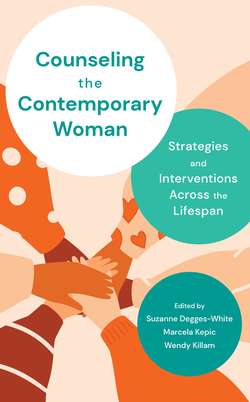Читать книгу Counseling the Contemporary Woman - Suzanne Degges-White - Страница 106
На сайте Литреса книга снята с продажи.
Aging Bodies
ОглавлениеThroughout the midlife period, many physical changes occur. For instance, menopause signals the end of fertility for women, and it also is a harbinger of other physical changes that women are often unprepared to acknowledge and accept. As the body’s production of estrogen winds down, health risks may increase and physical processes are altered. When fertility’s end is appreciated as freedom from the risk of pregnancy, some women perceive this as a gift. Other women perceive the loss of fertility as a symbol of the loss of their feminine power and sexual attractiveness. Concerns about sexual well-being can be exacerbated by the vaginal dryness that can accompany menopause, as it can negatively affect women’s desire for or pleasure in sexual intercourse (Waetjen et al., 2018). Unfortunately, the female body’s transition into midlife can be accompanied by changes that can be of both psychological and medical concern. Following is an overview of some of the most concerning outcomes of hormonal changes, such as bone density changes, cardiovascular changes, and changes to the skin and hair. While the majority of these are related to physiological changes that counselors are not able to address, it can benefit clients to have their concerns validated by a counselor and to normalize the changes that they are undergoing. In addition, if they are comparing themselves negatively to media images of beauty and feel that they are lacking, encourage them to focus on what their experience in life has taught them about their strengths and skills, and remind them that external appraisals of worth or value do more to damage all women than they do to help a single one.
